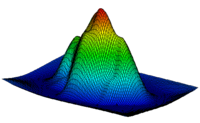GMS:2D Grid Types
| 2D Grid Module | |
|---|---|
 | |
| 2D Grid | |
| Creating and Editing 2D Grids | |
| Converting 2D Grids | |
| More | |
| 2D Grid Display Options | |
| 2D Grid Tool Palette | |
| Cell Properties | |
| 2D Grid Commands | |
Two types of grids are supported in the 2D Grid module: mesh-centered grids and cell-centered grids. With a mesh-centered grid, the data values are stored at the corners of the grid cells. With a cell-centered grid, data values are stored at the cell centers.
When a data set is imported to a cell-centered grid, there is one value in the data set for each cell. The contouring and fringing functions use scalar values at the cell corners. Therefore, whenever contouring or fringing is performed, the values at the cell centers are interpolated to the cell corners. Interpolation to cell corners is only done for visualization purposes. All computations performed using the data calculator are performed on the original values at the cell centers. With mesh-centered grids, all visualization and computations are performed at the cell corners and no interpolation is necessary.
Grids in GMS are Cartesian grids. That is, the row and column spacing in the grid can vary, but the row and column boundaries are straight. Each cell center or grid node can have a unique elevation. The grid can also be rotated about the Z axis if desired.
| [hide]GMS – Groundwater Modeling System | ||
|---|---|---|
| Modules: | 2D Grid • 2D Mesh • 2D Scatter Point • 3D Grid • 3D Mesh • 3D Scatter Point • Boreholes • GIS • Map • Solid • TINs • UGrids | |
| Models: | FEFLOW • FEMWATER • HydroGeoSphere • MODAEM • MODFLOW • MODPATH • mod-PATH3DU • MT3DMS • MT3D-USGS • PEST • PHT3D • RT3D • SEAM3D • SEAWAT • SEEP2D • T-PROGS • ZONEBUDGET | |
| Aquaveo | ||